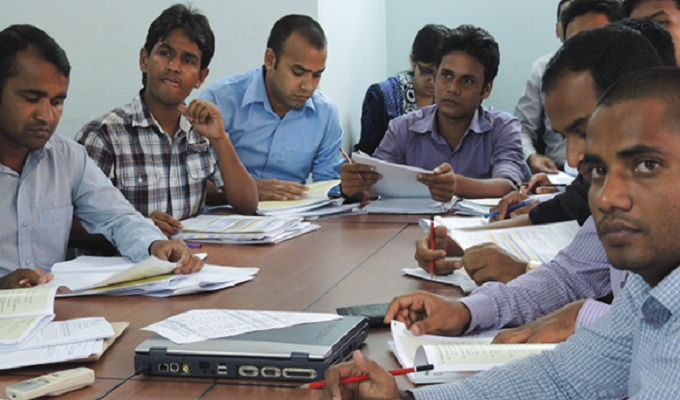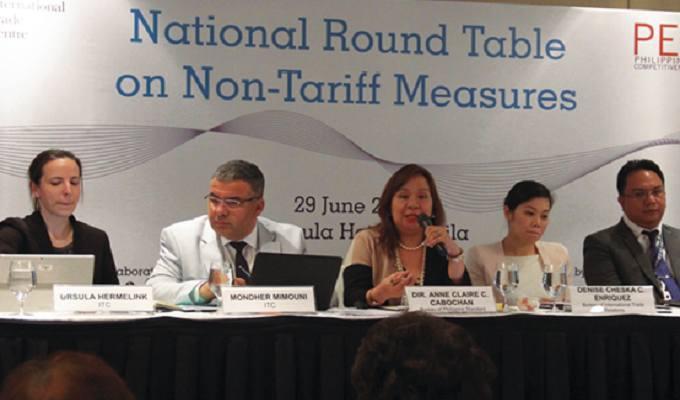

Tackling non-tariff measures at the regional level to improve the business climate for trade (en)
Decades of progressive market-opening have lowered tariff barriers around the world, with the result that non-tariff measures (NTMs) now loom larger as a source of trade frictions.
NTMs cover a wide range of policies such as technical regulations, sanitary and phytosanitary measures (SPS), quantitative restrictions, various fees and charges, certification requirements and other conformity assessment issues. Many of these policies are designed to protect consumer safety and the health of humans, plants and animals. Conforming to the demands of NTMs can imply significant costs for traders – costs that weigh particularly heavily on small and medium-sized enterprises (SMEs) in developing countries.
Streamlining NTMs has become a major component of national trade policy agendas, including in bilateral and regional integration initiatives. Despite significant progress, important challenges remain, in particular the harmonization of procedures for the enforcement of NTMs, which themselves can be a substantial source of uncertainty, costs and delays.
The responseITC works to address NTMs on multiple fronts. Transparency tools such as Market Access Map provide information on the requirements of thousands of mandatory and private standards. Business surveys reveal how companies in developing countries encounter NTM-related obstacles when seeking to trade across borders and shed light on whether those competitiveness-sapping obstacles are the result of bureaucratic procedures or the content of the measures themselves. The survey results can in turn be analysed to identify how regulatory and border agencies can remove inefficiencies that inhibit small firms in priority sectors from participating in the world economy but contribute little to achieving public policy goals. ITC works with governments and regional institutions to design and implement solutions to smooth trade flows.
Building on the NTM surveys, ITC developed a three-step methodology to address regulatory and procedural obstacles to trade at the regional level. First, it works with regional institutions and national governments to identify priority sectors, regulations and value chains for intervention based on the potential benefits that would result from region-wide reforms. Next, they examine the underlying causes of regulatory and procedural obstacles. The final step is to design and implement plans to address regulatory and procedural obstacles.
The resultsIn response to relatively low levels of intraregional trade and investment, ITC has been working in regions including the Central European Free Trade Agreement (CEFTA), the Arab states, and the Economic Community of West African States (ECOWAS) to identify and eliminate non-tariff barriers.
In the CEFTA bloc over a 16-month period, ITC mobilized private-sector lead firms and suppliers in the auto-parts and beverage sectors to identify burdensome trade barriers and articulate their concerns in a manner conducive to designing policy and regulatory reforms to address them. Publicprivate dialogue forged an informed consensus among CEFTA stakeholders – companies and governments – on what the most cumbersome NTMs were and how to address them. (In the beverage sector, these included discriminatory excise duties and the lack of mutual recognition of quality certificates; in the auto sector, complex customs documentation requirements were a particular source of problems.)
CEFTA parties in 2016 introduced a raft of trade facilitation procedures aimed at resolving these issues, pledging to accord mutual recognition to each other’s legislation and trade-related documentation and to eliminate the main NTMs identified in early 2017. These reforms promise to make trade procedures in the region more transparent and predictable, reducing trade costs and making it easier for companies to do business across borders within the region and internationally.
In the Southern Mediterranean region, business survey results and a regional roundtable on NTMs have informed ITC’s work to foster economic integration across Algeria, Egypt, Israel, Jordan, Lebanon, Morocco, the State of Palestine, Tunisia and Turkey. The EuroMed Trade Helpdesk was beta tested throughout 2016 ahead of a formal 2017 launch. Its online portal provides economic operators with information about trade statistics, customs procedures, business contacts, and tariff and non-tariff policies across the region while serving as a venue to share news and information about trade-related events. In addition, a problem-solving network of officials from trade and other ministries of the participating governments will work to increase transparency and promote intraregional trade and investment.
Alongside this work, ITC partnered with the League of Arab States and national institutions to address key NTM-related challenges identified through the business surveys. These included a lack of accredited laboratories to certify that products meet health and safety regulations; issues around the issuance and recognition of trade-related documents; and uncertainty about customs procedures. Thematic working groups produced a set of recommendations to promote region-wide harmonization of product quality and food safety measures as well as conformity assessment procedures.
In ECOWAS, where surveyed businesses indicated that trade within the region faced border surcharges and taxes not encountered in trade with the rest of the world, ITC and the African Development Bank jointly organized a high-level regional roundtable on NTMs in June. At the gathering, delegates from across the region agreed to tackle these border costs. They also agreed on action to tackle other NTMs identified in the surveys, such as quality requirements and testing for agricultural products; difficulties getting certificates of origin proving that manufactured goods are made in the region; and a level of regulatory and procedural obstacles to trade that is generally high compared to the rest of the world.
The futureCEFTA parties have agreed on the recommendations for NTM-related policy reforms for the auto-parts and beverage supply chains, and are now in the process of implementing them. ITC and CEFTA will build on this by working with GIZ, the German technical cooperation agency, to address NTMs along other value chains in the region.
In the Arab states, ITC will continue to shed light on NTMs and work with governments and regional institutions to implement the action plans to address rules of origin, product quality and food safety.
In the ECOWAS region, the recommendations from the NTM work fed into regional integration projects that will start implementation in 2017, such as a regional trade barriers alert system.



